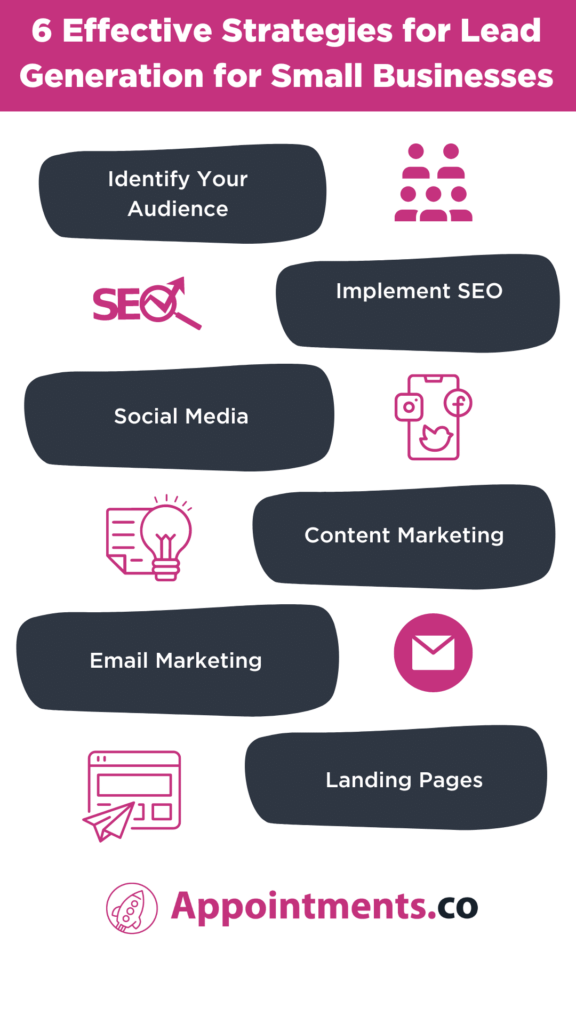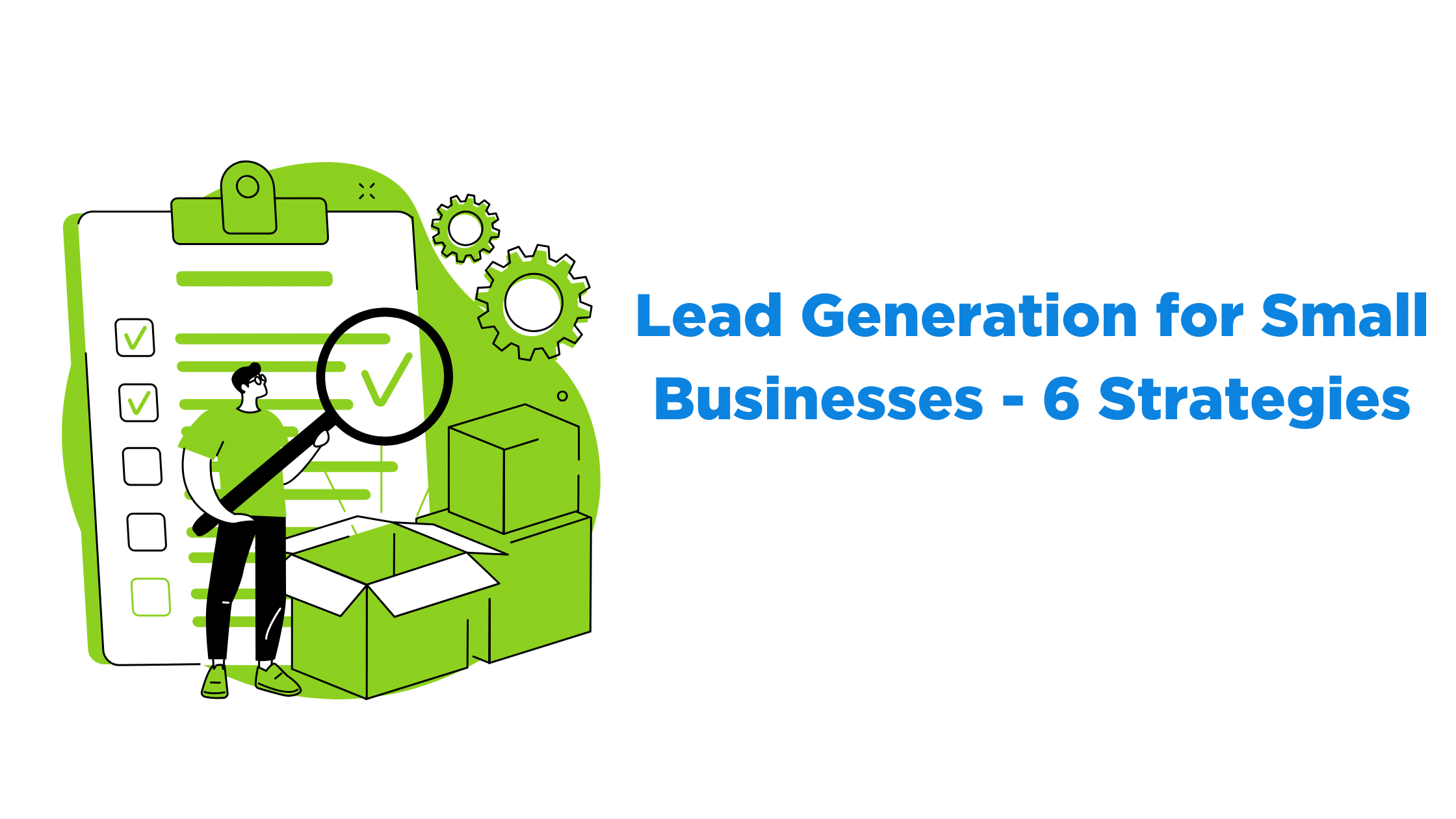Lead Generation for small businesses is a key strategy for every small-scale business to expand its client base. Did you know that 61% of marketers consider lead generation their primary challenge? Lead generation is widely considered one of the most challenging parts of their marketing strategy. If this is so, how can a small business with limited expertise and outreach potential make it possible? To help you with this, we have elaborated on some tips for effective lead generation for small businesses. Let’s get started!
Table of Contents
- Lead Generation for Small Businesses
- How Can Lead Generation Help You?
- Challenges in Small Businesses
- 6 Effective Strategies for Lead Generation for Small Businesses
- Frequently Asked Questions
- Related Reads
- Final Thoughts
Lead Generation for Small Businesses
Lead generation for small businesses is the primary need of any business. It helps the business in enriching its contact list with prospective clients. And with that, too, when your business is small, you definitely need a solid lead generation strategy to establish your brand among the audience and gain them as customers. By generating leads, and engaging them with valuable information and services, you can convert them into your customer.
How Can Lead Generation Help You
Lead generation converts your audience into prospects (leads) who might be interested in your brand, and its products or services. The final goal is to nurture these leads and convert them into customers by offering what they need. There are many ways to capture leads, some of which are listed below. These strategies can help you get prospects’ contact information to contact them with your offers through email and phone calls.
Sales and acquiring new clients depend on various factors, like pricing and your services. When it comes to lead generation, it depends on your avenues and the number of touchpoints you have. If you’re a small business owner, developing an effective lead-generation strategy should be your top priority.
Challenges in Small Businesses
If you are in the development stage or a firm with limited manpower, you might not afford the time, resources, and budget to generate leads. This can make it challenging for them to bring in quality leads. Here are some of the most common challenges a small business faces:
Lack of Expertise
There is a high chance that a small-scale business lacks a team of lead generation experts, who can solely stand accountable for their business growth. Their main focus is to strengthen their niche skills to exhibit a quality service.
Competition of Popular Brands
New brands or startups might go unnoticed among the authoritative big powers in the industry. Generally, people are more likely to go for a well-known brand instead of a new or less popular one. Being a small business, you may experience intense competition to sustain among established powers.
Limited Manpower
A small business hardly focuses on building a dedicated sales team, who can take their business to new heights. Enabling an omnichannel marketing approach to nurture your leads through all possible channels needs a solid team. Which is hard to build in a small-scale business with limited resources.
Brand Awareness
To grab your audience’s attention, you must be visible, and known to your target market. You might have thousands of leads out there in the market who will match your ideal customer profile. But, what if you are not known to them? To have them by your side, you must create awareness about your brand through lead generation strategies.
6 Effective Strategies for Lead Generation for Small Businesses
Generating leads is a one-stop solution that could help you overcome all these challenges. Here is a curated list of lead-generation strategies that would help small businesses to scale up their businesses.

1. Identify Your Audience
Identifying your target audience is the first step to starting a marketing campaign. As a small business, identifying and narrowing down your target audience may be less challenging. Make sure you ask questions like, what type of customers do my product/services benefit? What are their demographics and interests?
Focusing on questions like these gives you a firm idea of whom to target. An important strategy here is to create buyer personas, which represent your ideal customer based on real data from your existing customers and market research. These personas are extremely powerful in gleaning your customers’ motivations, and giving you insight into your audience’s mindset, so you can target them better.
2. Implement SEO
Search engines play a significant role in lead generation. Optimize the keywords you want to rank for, make it sound natural, and don’t do over it. Ensure your content contains all necessary SEO elements, such as keywords, titles, meta descriptions, alt tags, and URLs. Implementing SEO can increase your visibility, and attract quality leads to your small business.
3. Social Media
Social media is another powerful marketing channel that you can utilize to educate and attract your target audiences. The more creative you are with the social media posts, the more engagement you are likely to get, turning your brand’s social pages into a direct point of contact for prospects. You can gather leads and pass them on to the sales team through direct messages, and comments on your social profiles. Social media platforms can help your small business scale up. You can use Instagram, their branded tools to engage leads, such as creating sponsored ads to get more engagement.
You can also use remarketing to connect with your site visitors who still need to sign up. Remember, these visitors should have either made a purchase decision or contacted you. Think of remarketing to nurture leads by understanding a prospect’s historical interests and preferences.
4. Content Marketing
Small businesses can leverage the power of content marketing. Content marketing is more than just copywriting. You can create content according to the various buyers’ personas, as well as buyers’ demographics and pain points. You must create different types of content for the audience, such as blogs, social media posts, podcasts, videos, webinars, eBooks, quizzes, infographics, or any other form of content.
Lead generation techniques are more than just copywriting. Audio plus visual content can help with that. Many prefer podcasts, infographics, or videos over lengthy blogs and white papers. If you offer quality webinars or podcasts related to the pain points of your target audience, you are likely to capture quality leads. Retargeting adverts on social media is a valuable method to engage your audience for small businesses.
Retargeting sends ads to people interested in your brand, such as visiting your website, buying a lower-level product, or downloading gated content.
5. Email Marketing
Email marketing is one of the small businesses’ best and most effective lead-generation strategies. A recent Hubspot report says their email marketing strategy was effective for meeting business goals in 2021. Drip campaigns, newsletters, and event-based emails are some effective methods to help nurture your leads for small businesses. You can also utilize email automation to run your email marketing campaigns for your subscribers. You can also track your audience engagement through email open and click-through rates (CTR).
6. Landing Pages
Landing pages offer more potential when it comes to lead generation. If you are a small business, you need to capture leads on website landing pages strategically, such as implementing the right call to action, having a concise and clear content copy, and offering desirable benefits. A properly designed and well-structured page can easily convert prospects into leads and increases your discoverability. Your landing page is like a storefront. There should be crystal-clear welcome messages and unique offerings to attract and bring in potential customers.
FAQs
1. What is a CTA?
A CTA, or Call to Action, is any phrase, button, link, or image that leads to the audience visiting your site, or checking out your product or service. Using multiple CTA throughout your marketing material leads to multiple touchpoints and, in turn, more quality leads.
2. Can you generate leads through content?
Yes, you can generate leads through content. Content marketing is one of the most effective ways to develop leads, as it is more affordable and offers a more significant return on investment in the long run.
3. Why is lead generation important for small businesses?
Lead generation has the potential and allows the collection of valuable information from the prospect. Utilizing lead generation can help small businesses get more qualified leads, understand your customers’ needs and wants, and assist you in tailoring your product or service to suit your customers’ needs.
Final Thoughts
Lead generation for small businesses can be daunting, but it is worth the hard work if you intend to close more deals. However, keeping in mind some of the best lead-generation tips can help your small business work wonders. A few tweaks to your content, lead qualification, sales, and marketing strategy can enable you to achieve your desired conversion for your small business. But, if you are a growing organization, and lead generation requires resources, outsourcing lead generation may be your best option. If you’re looking for lead generation services, feel free to reach out to us!
Related Posts
Illustrations by Storyset



